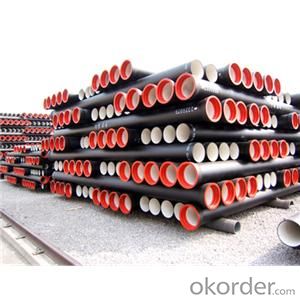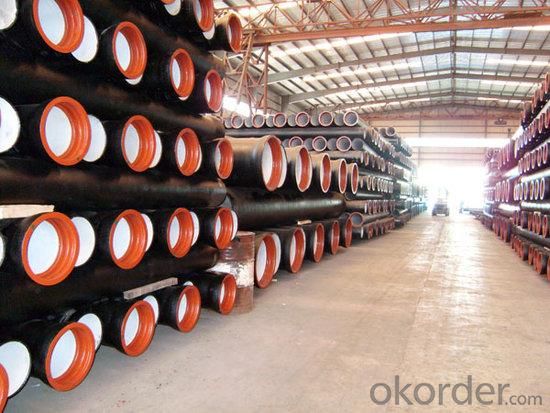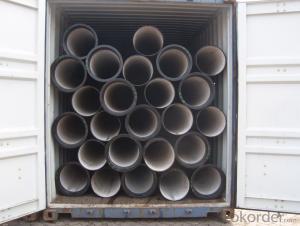Ductile Iron Pipe High Quality EN598 K8 DN2400
- Loading Port:
- China main port
- Payment Terms:
- TT OR LC
- Min Order Qty:
- 999 m
- Supply Capability:
- 9999 m/month
OKorder Service Pledge
OKorder Financial Service
You Might Also Like
1,Ductile Iron Pipe Description :
1) Pipes confirm to ISO2531,K9 class,T type joint,6m long,with inside cements lining conform to ISO4179, outside Zinc spraying(130g/m2) and bitumen coating(70μm) conform to ISO8179.
2) Pipe ends: Spigot and socket ends, with 100% SBR rubber gaskets accoding to ISO4633
3) we can do third party inspection according to customer's request.
4) Our products have been sold to many international market, such as Middle East and South East Asia and Africa.
2,Main Features of the Ductile Iron Pipe:
•High yield strength
•High tensile Strength
•High corrosion resistance
•Pressure Resistence
•Satisfy the highest hygienic standards
Material: Ductile iron grade 500-7/ 450-10 in accordance with ISO1083
Standard: ISO 2531, EN545, EN598, ANSI, AWWA
3,Ductile Iron Pipe Images:


4. Ductile Iron Pipe Specification
1.Standard: API SPEC 5L 44th eidtion,ASTM A252-98(2007)
2.Grade: A53 Grades A/B, ASTM A106 Grades B/C,ASTM A179
AWWA, C200, ASTM A139, ASTM A120, API 5L Grade B
X42, X52, X56, X60, X65, X70, X80, X100
3.Weld Alternatives: LSAW
4.OD size range: 6.4~44.5mm
5.Wall thickness: 406.4~1422mm
6.Length: 3 - 12 m according to requirment
5.FAQ:
We have organized several common questions for our clients,may help you sincerely:
1.Q: Why would you choose ductile iron pipe rather than other pipe materials?
A:The reasons are obvious for that not only ductile iron pipe possesses the inherent strength and flexibility of ductile iron, combined with proven corrosion protection systems, but also the cost savings can be achieved from design to installation and commissioning.
2.Q:Why can you guarantee the inner of pipes can’t be corroded?
A: High alumina cement mortar lining and sulphate-resistant cement mortar lining. These two special linings are applicable to inner anti-corrosion for sewage pipes, improving resistance to erosion of the sewage components.
- Q:How do ductile iron pipes perform in freeze-thaw cycles?
- Ductile iron pipes perform exceptionally well in freeze-thaw cycles. The material properties of ductile iron, such as its high tensile strength and excellent impact resistance, make it highly resistant to the stresses caused by freeze-thaw cycles. Unlike other materials, ductile iron pipes can withstand the expansion and contraction that occurs during freezing and thawing without cracking or breaking. One of the key reasons why ductile iron pipes excel in freeze-thaw conditions is their ability to absorb and dissipate stresses. The high ductility of the material allows it to deform slightly under stress, thereby releasing the built-up pressure and preventing any damage to the pipe. This characteristic ensures that the pipes can handle the repeated cycles of freezing and thawing without compromising their structural integrity. Additionally, ductile iron pipes have a protective and durable coating, such as cement mortar lining or polyethylene encasement, which further enhances their resistance to freeze-thaw cycles. These coatings provide an additional layer of protection and prevent water from coming into direct contact with the iron, reducing the potential for corrosion. Furthermore, ductile iron pipes have a long service life, typically exceeding 100 years. This longevity is attributed to the material's inherent strength and resistance to various environmental factors, including freeze-thaw cycles. The pipes' ability to withstand these cycles without significant damage ensures the reliability and durability of the water distribution system, even in areas prone to freezing temperatures. In conclusion, ductile iron pipes are highly reliable and perform exceptionally well in freeze-thaw cycles. Their high tensile strength, impact resistance, ability to absorb stresses, and protective coatings make them a preferred choice for water distribution systems in regions with harsh winter conditions.
- Q:Can the sealing ring of ductile iron pipe be reused?
- The sealing ring is hard to install and take off. I have been in this line for six years. I haven't seen it removed. The rubber ring itself is not expensive. It is not necessary to reuse it.
- Q:What are the differences between cast iron pipes W and A?
- Type W: combination of both advantages of the connection type A interface has the advantages of high strength and convenient installation, because of the use of W type straight pipe and reduces the material cost and can be coupled with the design structure of the B type pipe is more compact than the A type pipe, saving installation space.
- Q:How do ductile iron pipes perform in seismic zones?
- Ductile iron pipes have proven to perform exceptionally well in seismic zones due to their unique characteristics and design features. These pipes are known for their ability to withstand ground movements, vibrations, and other seismic forces that may occur during an earthquake. The inherent flexibility of ductile iron pipes allows them to absorb and distribute the energy generated by seismic activities. This flexibility helps prevent the pipes from fracturing or breaking under intense ground shaking. Additionally, the high strength and resilience of ductile iron make it highly resistant to damage caused by ground movements. Furthermore, ductile iron pipes are designed with restrained joints, which provide added stability and resistance to seismic forces. These joints can accommodate small lateral movements without compromising the integrity of the pipeline system. The restrained joints also prevent the pipes from becoming disconnected or misaligned during seismic events, ensuring the continuous flow of water or other fluids. In seismic zones, where the ground is more prone to liquefaction or soil settlement, ductile iron pipes are often installed using methods that enhance their stability. For instance, the use of deep embedment techniques or the incorporation of thrust blocks at bends and fittings increases the resistance of the pipes to the lateral forces exerted by the ground. The performance of ductile iron pipes in seismic zones is further enhanced by regular inspection and maintenance. Periodic assessments can detect any potential weaknesses or damages that may have occurred during seismic events, allowing for timely repairs or replacements to be made. Overall, ductile iron pipes have a proven track record of reliable performance in seismic zones. Their flexibility, strength, and design characteristics make them highly resilient to seismic forces, ensuring the safe and uninterrupted supply of water or other fluids even in areas prone to earthquakes.
- Q:Are ductile iron pipes suitable for underground storage tanks?
- Underground storage tanks can indeed benefit from the use of ductile iron pipes. Ductile iron, known for its strength and durability, exhibits exceptional resistance to corrosion and can withstand the immense pressure and weight associated with burial underground. These pipes find widespread application in various underground systems, such as water and sewage systems, owing to their remarkable tensile strength and ability to handle both internal and external loads. Furthermore, ductile iron pipes boast an extended service life, often surpassing 100 years, rendering them a dependable choice for underground storage tanks. They also possess resistance against ground movement and can adapt to soil settling or shifting, thereby ensuring the integrity and stability of the storage tank system. Moreover, the smooth internal surface of ductile iron pipes provides excellent flow characteristics, preventing the accumulation of debris or sediment that may impede the system. Hence, they prove to be an ideal option for storing a diverse range of liquids or substances. In conclusion, the strength, durability, corrosion resistance, and long service life of ductile iron pipes establish them as a suitable and reliable choice for underground storage tanks.
- Q:How do ductile iron pipes compare to PVC pipes?
- Plumbing and water distribution systems commonly utilize ductile iron pipes and PVC pipes. When comparing these materials, various factors should be taken into account. Strength and Durability: Ductile iron pipes are renowned for their exceptional strength and durability. They can withstand high pressure and heavy loads, making them suitable for underground and high-traffic areas. Conversely, PVC pipes are less sturdy and more prone to cracking under extreme conditions. However, PVC pipes have the advantage of being corrosion-resistant and do not rust, which is beneficial in certain environments. Installation and Maintenance: Ductile iron pipes are heavier and require specialized equipment and skilled labor for proper installation. In contrast, PVC pipes are lightweight and easy to handle, making installation simpler and quicker. Additionally, PVC pipes require less maintenance as they do not corrode or develop mineral deposits over time, unlike ductile iron pipes which may need regular cleaning and maintenance to prevent rust and sediment buildup. Cost: PVC pipes generally have a lower cost compared to ductile iron pipes. The lower material and installation expenses associated with PVC pipes make them a popular choice for budget-friendly residential and commercial plumbing projects. Ductile iron pipes, while offering superior strength and durability, tend to be more expensive due to the higher cost of materials, specialized installation requirements, and additional maintenance expenses. Environmental Impact: PVC pipes are made from non-renewable resources and can have a negative environmental impact during production and disposal. On the other hand, ductile iron pipes are made from recycled iron and have a longer lifespan, reducing the need for replacement and minimizing waste. However, it is important to note that PVC pipes can be recycled, and many manufacturers have implemented sustainable practices to minimize their environmental footprint. In conclusion, ductile iron pipes and PVC pipes possess distinct characteristics that make them suitable for different applications. Ductile iron pipes excel in strength and durability, making them ideal for heavy-duty applications, while PVC pipes offer cost-effectiveness, easy installation, and corrosion resistance. Ultimately, the choice between the two materials depends on the specific requirements, budget, and environmental considerations of the project.
- Q:What's the difference between grey cast iron pipe and ductile iron pipe?
- Spheroidal graphite cast iron and ordinary cast iron contain graphite monomer, that is to say, cast iron is a mixture of iron and graphite. The graphite in ordinary cast iron is flaky, and the strength of graphite is very low, so there are many flakes of voids in the cast iron, so the strength of ordinary cast iron is lower and more brittle. Graphite in graphite cast iron is spherical, equivalent to the existence of many spherical voids in cast iron. The effect of spherical voids on the strength of cast iron is much smaller than that of sheet voids, so the strength of nodular cast iron is much higher than that of ordinary cast iron.
- Q:How can the cast iron pipe be connected?
- Cast iron pipes are flanged and socket connected
- Q:What is the cost of ductile iron pipes compared to other materials?
- Several factors, such as size, length, and application, can cause the cost of ductile iron pipes to vary when compared to other materials. Generally, ductile iron pipes are more expensive than PVC or HDPE pipes due to their superior strength, durability, and longevity. Although the initial cost of ductile iron pipes may be higher, they offer a cost-effective solution in the long term because of their extended lifespan. With a life expectancy of over 100 years, ductile iron pipes are reliable and require minimal maintenance for water, sewage, and gas distribution systems. This longevity reduces the need for frequent replacements, repairs, and associated expenses. Additionally, ductile iron pipes are known for their exceptional resistance to external loads, pressure, and corrosion, making them suitable for various applications, including high-pressure water and gas transmission, industrial pipelines, and sewer systems. The inherent strength of ductile iron pipes allows for thinner walls, resulting in reduced material and installation costs compared to other materials. It is important to consider that the cost of ductile iron pipes can also be influenced by market conditions, transportation costs, and the availability of raw materials. Therefore, it is advisable to consult with suppliers and conduct a cost-benefit analysis before making a decision.
- Q:What is the minimum operating temperature for ductile iron pipes?
- The minimum operating temperature for ductile iron pipes is typically around -20 degrees Celsius (-4 degrees Fahrenheit).
1. Manufacturer Overview |
|
|---|---|
| Location | |
| Year Established | |
| Annual Output Value | |
| Main Markets | |
| Company Certifications | |
2. Manufacturer Certificates |
|
|---|---|
| a) Certification Name | |
| Range | |
| Reference | |
| Validity Period | |
3. Manufacturer Capability |
|
|---|---|
| a)Trade Capacity | |
| Nearest Port | |
| Export Percentage | |
| No.of Employees in Trade Department | |
| Language Spoken: | |
| b)Factory Information | |
| Factory Size: | |
| No. of Production Lines | |
| Contract Manufacturing | |
| Product Price Range | |
Send your message to us
Ductile Iron Pipe High Quality EN598 K8 DN2400
- Loading Port:
- China main port
- Payment Terms:
- TT OR LC
- Min Order Qty:
- 999 m
- Supply Capability:
- 9999 m/month
OKorder Service Pledge
OKorder Financial Service
Similar products
New products
Hot products
Related keywords



























